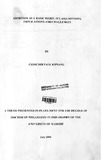| dc.description.abstract | The current debate on abortion has given rise to a group of feminists who hold that unrestricted
access to abortion and complete reproductive freedom is a woman's basic right. This study is
premised on he understanding that the issue of abortion is complex and multifaceted. The issue is
profound because it touches on our value systems and affects human relations, especially between
men and women, children and parents and between siblings. Abortion is an issue, which
significantly affects the future of humanity and the value that one attributes to human life.
It is as a result of this complexity that the issue has polarized the human society into various
groupings, namely: the conservatives, the moderates and the liberalists. Our major concern in this
study is the extreme liberalist position that abortion is a woman's basic right. Among the
proponents of this position are the radical feminists. This group of feminists is generally referred
to as radical pro-choice feminists.
This study set out to critically examine the underlying assumptions, implications and challenges
of holding this position of unrestricted access to abortion and complete reproductive freedom as a
woman's basic right. The study found out the following:
i) The woman's decision to abort affects not only the woman's self-image but also her
health and life.
ii) By denying the partner right to participate in decision-making, the claim will impact
negatively on the woman, as the partner will have reason to run away from his social
and financial obligations.
iii) The recourse to abortion does not only affect the society's attitudes towards the
unborn children but also to the other sections of humanity who may fall under the
same category.
iv) The pro-choice feminist's demand, if granted, could tear the family set up apart as it
impacts negatively on the mutual cooperation between family members that is a vital
ingredient of a healthy family life.
v) The claim assist women to deny procreation of the human race which nature has
bestowed upon them.
vi) That there are other viable options to the abortion decision.Consequently, the study concluded, in the light of the fmdings that the woman's demand on
unrestricted access to abortion and complete reproductive freedom as a woman's primary right;
contrary to the claims of its proponents is detrimental to the advancement of the women cause
and by extension the entire humanity.
In response to the findings of this study, and in an attempt to reverse the current trend and thus
save women and the entire human society from further denigration, this study has called for a reexamination
and re-evaluation of the radical feminist's standpoint and the society's attitude
towards life and the well being of women and children.
It is believed that this study will make some modest contributions to the world of scholarship,
more particularly, it is hoped that it will provide useful material and information to individuals,
families, organizations, academic institutions of higher learning and government policy makers,
in areas pertaining to the advancement of the women cause and other disadvantaged members of
the human society.
Finally it is hoped that this study shall help bring about major attitudinal changes among
members of the human society towards life, and that in the process women shall pick up the
broken pieces of their destiny and confidently acknowledge and assert themselves in their unique
role as the primary agents of procreation and custodians of human life. | en |

